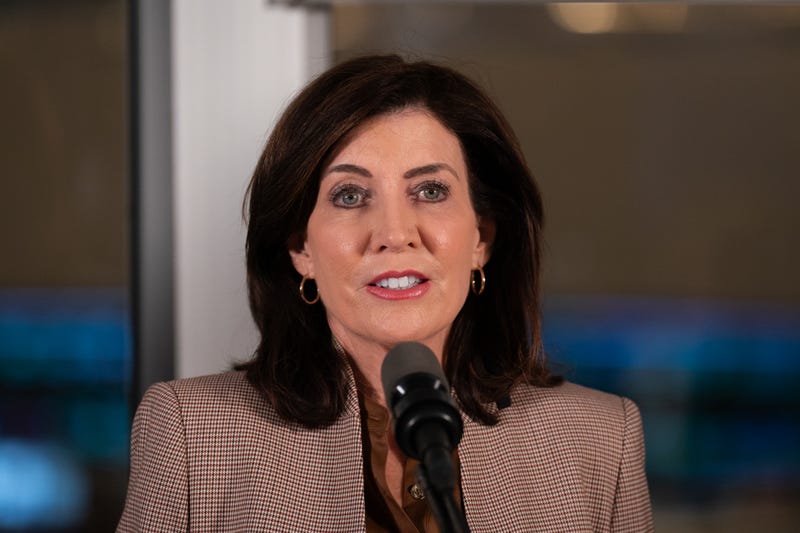
NEW YORK (1010 WINS/WCBS 880) – Gov. Kathy Hochul on Monday answered questions during a press conference about the indefinite pause of the congestion pricing program, suggesting that the suspension doesn’t mean the end of the plan but opens the door to reconsider various aspects of the plan.
Reporter Juliet Papa asked Hochul whether the indefinite pause on congestion pricing could mean changes to the fees, the times it applies, and the areas it covers. Hochul responded that "all options are on the table for future conversations."
"There's a big difference between a pause and elimination," she added. "Elimination was an option."
Hochul clarified that she is not eliminating the congestion pricing plan, but acknowledged a lack of creativity in finding alternative funding for public transportation improvements, a matter currently being discussed with the legislature. "To assume that the only funding source had to be congestion pricing shows a lack of imagination about understanding other opportunities," she said.
She also restated her support for mass transit. "I understand the level of concern at this time. But as the governor of the State of New York, I am committed to continuing those projects with alternative funding that is being worked out with the legislature. I gave them a number of options. Those conversations are very much alive and ongoing, and it will be resolved."
Although Hochul did not provide specifics on the alternative funding opportunities, she indicated that discussions are ongoing with legislative leaders and MTA Chairman Janno Lieber.
"I spoke to Janno Lieber yesterday, and he has been working hard with me," Hochul said.
Lieber has not yet made a public statement about the pause since Hochul directed the MTA to "indefinitely pause" the congestion pricing plan for Manhattan—nearly a month before it was set to begin stating that she had concerns about the plan's impact on the finances of everyday New Yorkers and on the city's post-pandemic recovery.
In a recorded announcement to the state last week, Hochul called the move a "difficult decision" and said she still supports the overall environmental goals of the plan—including reducing congestion and pollution—but she said implementing the tolling “risks too many unintended consequences for New Yorkers at this time.”
She acknowledged “hardworking New Yorkers are being hammered by costs,” citing inflation and the high costs of living in the metro area. She also said circumstances have changed in Manhattan post-pandemic, including with the option of remote work.
"Let's be real, a $15 charge may not seem like a lot to someone who has the means, but it can break the budget of a hardworking or middle class household. It puts the squeeze on the very people who make this city go," she said in an address to the state.
“This decision is about doing what’s right for the people who make our city thrive,” she said. “I’m here to say we are listening.”
Politico reported that the governor is also concerned about the implications for vulnerable Democrats in competitive U.S. House races, with the November elections just five months away. Hochul appeared to address such conclusions, saying, "To those cynics who question my motivation, I approach every decision through one lens: What is best for New Yorkers?"
The plan is suspended for now with no implementation in sight. The state will be backstopping the MTA capital plan and exploring other funding options as needed, according to sources.
Mayor Eric Adams said last week that he would support the governor’s decision to reassess. “If she’s looking at what others we can do it and how we can do it correctly, I’m all for it,” he said. “This is a major shift for our city and it has to be done correctly.”
Members of the MTA board, which oversees the transit agency, said they had not been briefed on the delay. “I’m in shock,” said Andrew Albert, a member of the board. ”We won’t get new buses, new subway cars, new signals. It’s a betrayal of the millions and millions of people who would have been helped by this.”
The stunning turnaround came less than a month before the Manhattan congestion toll was set to begin on June 30. The MTA has already invested tens of millions of dollars installing cameras, sensors, license plate readers and other equipment on city roadways in anticipation of the plan’s launch. And the agency had planned a series of public webinars—set to start Wednesday—to explain to the public how the system would work. Those webinars are now postponed "until further notice," according to the MTA website.
The MTA has pushed ahead with the controversial tolling program despite a cascade of lawsuits and outcry from various groups, including cabbies, truckers, suburban commuters, small business owners and the state of New Jersey. Some of the lawsuits are still playing out in the courts.
The Associated Press contributed to this report.
